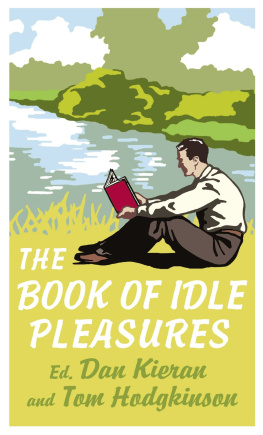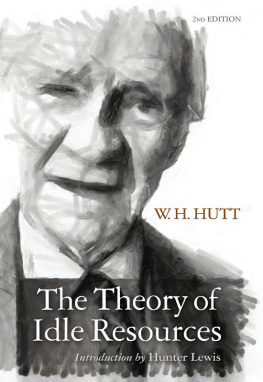IN IDLE MOMENT
'Are you not frequently idle?' 'Never, brother. When we are not engaged in our traffic we are engaged in our relaxations.'BORROW.
On the smooth beaches and in the silent bush, where time is not regulated by formalities or shackled by conventions, there delicious lapsesfag-ends of the day to be utilised in a dreamy mood which observes and accepts the happenings of Nature without disturbing the shyest of her manifestations or permitting 'the-mind to dwell on any but the vaguest speculations.
Such idle moments are mine. Let these pages tell of their occupation.
As the years pass it is proved that the administration of the affairs of an island, the settled population of which is limited to three, involves pleasant though exacting duties. It is a gainful governmentnot gainful in the accepted sense, but in all that vitally matterspersonal freedom, absence of irksome regulations remindful of the street, liberty to enjoy the mood of the moment and to commune with Nature in her most fascinating aspects. Those who are out of touch with great and dusty events may, by way of compensation, be the more sensitive to the processes of the universe, which, though incessantly repeated, are blessed with recurrent freshness.
The sun rises, travels across a cloudless sky, gleams on a sailless sea, disappears behind purple mountains gilding their outline, and the day is done. Not a single dust-speck has soiled sky or earth; not the faintest echo of noisy labours disturbed the silences; not an alien sight has intruded. What can there be in such a scene to exhilarate? Must not the inhabitants vegetate dully after the style of their own bananas? Actually the day has been all too brief for the accomplishment of inevitable duties and to the complete enjoyment of all too alluring relaxations.
Here is opportunity to patronise the sun, to revel in the companionship of the sea, to confirm the usage of beaches, to admonish winds to seemliness and secrecy, to approve good-tempered trees, to exchange confidences with flowering plants, to claim the perfumed air, to rejoice in the silence
Not learning more than the fond eye doth teach,
Which pries not to th' interior.
How oft is the confession that the fullest moments of life are achieved when I roam the beaches with little more in the way of raiment than sunburn and naught in hand save the leaves of some strange, sand-loving plant? Then is it that the individual is magnified. The sun salutes. The wind fans. The sea sighs a love melody. The caressing sand takes print of my foot alone. All the world might be mine, for none is present to dispute possession. The sailless sea smiles in ripples, and strews its verge with treasures for my acceptance. The sky's purity enriches my soul. Shall I not joy therein?
Though he may be unable to attain those moments of irresistible intuition which came to Amiel, when a man feels himself great like the universe and calm like a god, one may thrill with love and admiration for Nature without resigning sense of superiority over all other of her works or abating one jot of justifiable pride.
Even in tropical Queensland there is a sense of revivification during the last half of August and first of September, and the soul of man responds thereto, as do plants and birds, in lawful manner. Perhaps it is that the alien dweller in lands of the sun, when he frisks mentally and physically at this sprightly season, is merely obeying an imperative characteristic bred into him during untold generations when the winter was cruelly real and spring a joyful release from cold and distress. The cause may be slight, but there is none to doubt the actual awakening, for it is persuasive and irresistible.
The lemon-trees are discarding the burden of superfluous fruit with almost immoderate haste, for the gentle flowers must have their day. Pomeloes have put forth new growth a yard long in less than a fortnight, and are preparing a bridal array of blooms such as will make birds and butterflies frantic with admiration and perfume the scene for the compass of a mile. The buff-and-yellow sprays of the mango attract millions of humming insects, great and small. Most of the orchids are in full flower, the coral-trees glow, the castanospermum is full of bud, loose bunches of white fruit decorate the creeping palms, and the sunflower-tree is blotched with gold in masses. The birds make declaration of attachment for the season.
Great trees, amorous birds, frail insects, perceive the subtle influence of the season, and shall not coarse-fibred man rejoice, though there be little or nothing to which he may point as special evidence of inspiration? He may feel the indefinable without comprehending any material reason why. He may confess, although there is but a trifle more sunshine than a month agoand what influence a trifle where there is so muchand scarcely any difference of temperature, that Nature is insisting on obedience to one of her mighty lawsthe law of heredity. Why, therefore, refrain from justifying the allusion? Why persist in declining the invitations of the hour? Far be it from me to do so. Is sufferance the cognizance of this Free Isle?
All my days are Days of the Sun. All my days are holy. Duty may suggest the propriety of contentment within four walls. Inclination and the thrill of the season lure me to gloat over the more manifest of its magic. Be sure that, unabashed and impenitent, shall I riot over sordid industry during the most gracious time of year to hearken to the eloquence and accept the teachings of unpeopled spaces.
Such is the silence of the bush that the silken rustle of the butterflies becomes audible and the distinctive flight of birds is recognisednot alone such exaggerated differences as the whirr of quail, the bustle of scrub fowl, and the whistle and clacking of nutmeg pigeons, but the delicate and tender characteristics of the wing notes of the meeker kinds of doves and the honey-eaters, and also the calculated flutterings of the fly-catchers. In the whistling swoop of the grey goshawk there is a note of ominous blood-thirstiness, silent though the destroyer has sat awaiting the moment for swift and decisive action.
Seldom, even on the stillest evening, may the presence of the night-jar be detected, except by its coarse call, while the sprightly little sun-bird flits hither and thither, prodigal of its vivid colours and joying with machine-like whirring. The sun-bird exemplifies the brightness of the day. All its activities are bold and conspicuous. Aptly named, it has nothing to hide, no deeds which will not withstand the scrutiny of the vividest rays.









